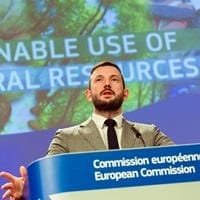(BRUSSELS) – The European Commission adopted Wednesday a package of measures for a sustainable use of key natural resources, which will also strengthen the resilience of EU food systems and farming.
A soil monitoring law will put the EU on a pathway to healthy soils by 2050, by gathering data on the health of soils and making it available to farmers and other soil managers, says the EU executive.
The proposal “will boost Europe’s resilience and ensure a viable future for our farmers, landowners and people,” said Environment Commissioner Virginijus Sinkevicius: “In a nutshell, it legally defines healthy soils and allow us gather data on the state of soils, make a sustainable soil management the norm and very importantly help decontaminate polluted soils.”
The law also makes sustainable soil management the norm and addresses situations of unacceptable health and environment risks due to soil contamination. According to the Commission, the new proposals will also boost innovation and sustainability, by enabling the safe use of technical progress in new genomic techniques, to enable developing climate-resilient crops and reducing the use of chemical pesticides, and by ensuring more sustainable, high-quality and diverse seeds and reproductive material for plants and forests. Finally, new measures also propose to reduce food and textile waste, which will contribute to a more efficient use of natural resources and a further reduction of greenhouse gas emissions from these sectors.
The EU executive says the measures will bring long-term economic, social, health and environmental benefits to everyone. By ensuring more resilient natural assets, the new rules in particular support people living directly from land and nature. They will contribute to prosperous rural areas, food security, a resilient and thriving bioeconomy, put the EU at the forefront of innovation and development and help reverse biodiversity loss and prepare for the consequences of climate change.
Soil: 60 to 70% of soils in the EU are currently unhealthy. In addition, a billion tonnes of soil are washed away every year due to erosion, which means that the remaining fertile top layer is disappearing quickly. Costs associated with soil degradation are estimated at over 50 billion per year.
The proposal for the first-ever EU legislation on soils provides a harmonised definition of soil health, puts in place a comprehensive and coherent monitoring framework and fosters sustainable soil management and remediation of contaminated sites. The proposal brings several sources of soil data under one roof, combining soil sampling data from the EU’s Land Use and Coverage Area frame Survey (LUCAS) with satellite data from Copernicus, and national and private data. The ultimate goal is to achieve healthy EU soils by 2050, in line with the EU Zero Pollution ambition.
The Commission’s proposal will:
- establish two categories of plants obtained by NGTs: NGT plants comparable to naturally occurring or conventional plants, and NGT plants with more complex modifications;
- both categories will be subject to different requirements to reach the market taking into account their different characteristics and risk profiles. The plants from the first category will need to be notified. The plants from the second category will go through the more extensive process of the GMO directive;
- give incentives to steer the development of plants towards more sustainability;
- ensure transparency about all NGT plants on the EU market (for e.g., through labelling of seeds);
- offer robust monitoring of economic, environmental and social impacts of NGT products.
Plant and Forest Reproductive Materials: the European seed sector is the largest exporter in the global seed market (20% of the global market with an estimated value of 7-10 billion and 7,000 companies mostly SMEs). It is important that the legislation is up to speed with the evolution of science. This proposal will update and simplify the current rules, some of which are more than 50-years old.
The proposed Regulation on the production and marketing of plant and forest reproductive materials will increase the diversity and quality of seeds, cuttings, and other plant reproductive material (PRM). They will guarantee stable yields by future-proofing plant varieties through sustainability testing (e.g., disease resistance). Seeds will also be better adapted to the pressures of climate change and help preserve the genetic diversity of cultivated crops and contribute to ensuring food security. The proposal will cut red tape and
Reducing food and textile waste: nearly 59 million tonnes of food (131 kg/inhabitant) are wasted in the EU each year with estimated market value of 132 billion. Over half of food waste (53%) is generated by households, followed by the processing and manufacturing sector (20%). Fighting food waste is a triple win: it saves food for human consumption and thereby contributes to food security. It helps companies and consumers to save money, and it lowers the environmental impact of food production and consumption.
To accelerate the EU’s progress, the Commission proposes that, by 2030, Member States reduce food waste by 10%, in processing and manufacturing, and by 30% (per capita), jointly at retail and consumption (restaurants, food services and households).
Textile waste also burdens limited natural resources. Around 78% of the textiles waste is not separately collected by consumers and ends up in mixed household waste, destined to be incinerated or landfilled.
Communication on Sustainable Use of Natural Resources
New Genomic Techniques proposal
Proposal on New Genomic Techniques - guide
Factsheet on New Genomic Techniques
Plant and Forest Reproductive Material proposal
Questions and Answers on Plant and Forest Reproductive Material
Factsheet on Plant and Forest Reproductive Material
Reducing Food Waste in the EU - guide
Directive on Soil Monitoring and Resilience - guide


